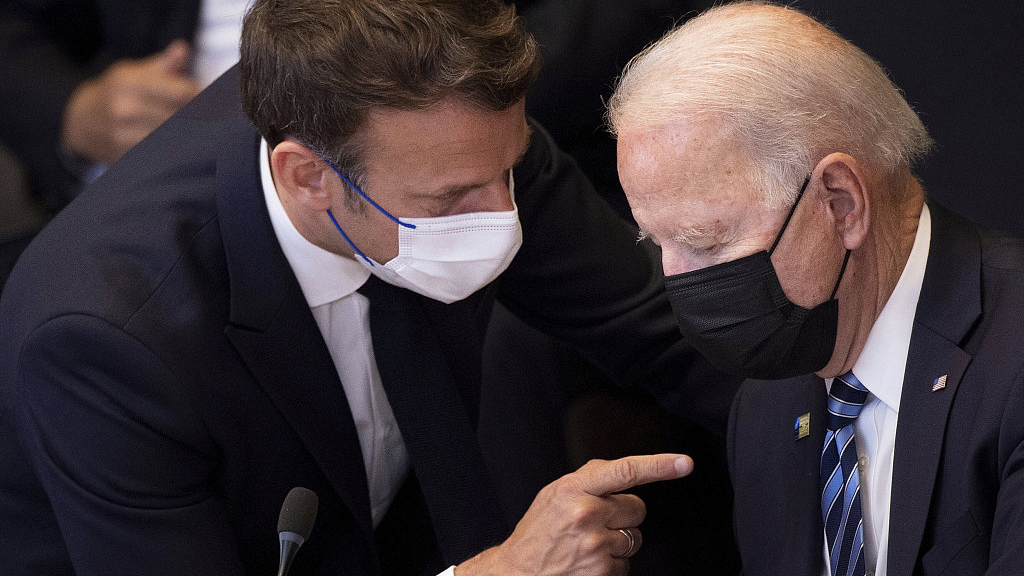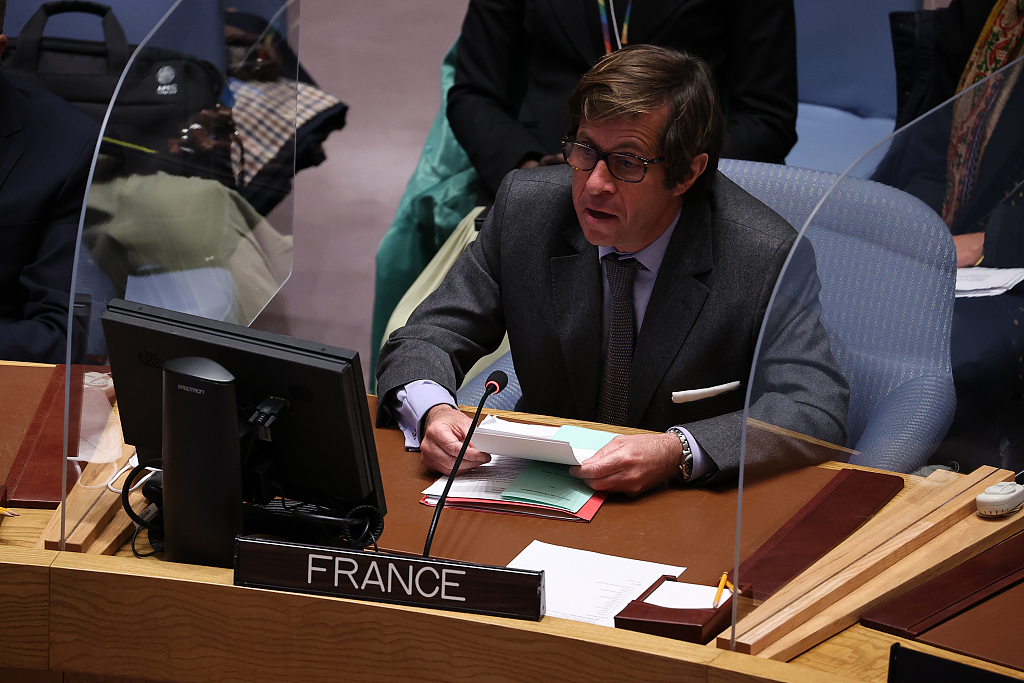
French President Emmanuel Macron (L) speaks with U.S. President Joe Biden during a NATO summit at NATO headquarters in Brussels, Belgium, June 14, 2021. /VCG
French President Emmanuel Macron (L) speaks with U.S. President Joe Biden during a NATO summit at NATO headquarters in Brussels, Belgium, June 14, 2021. /VCG
Editor's note: Hayat Bangash is a Pakistani freelance columnist on international affairs with degrees in business administration and war studies. The article reflects the author's opinions and not necessarily the views of CGTN.
France's presidential election is nearing. On the surface, the calls by some candidates to reshape France's role in North Atlantic Treaty Organization (NATO) may be a political gimmick. But the opinion is far more deeply entrenched in French politics, society and bureaucracy.
The escalation of Russia-Ukraine tensions has toned down the conversation but not the underlying convictions. What at least three candidates – apart from Emmanuel Macron, who is also in the race – are calling for is more strategic autonomy in the legacy of Charles de Gaulle, the statesman general who adopted a realistic approach toward France's place in NATO even at the height of the Cold War.
The renewed discussion revolves around some key views. The most dominant is the unwillingness to "be dragged into other people's conflicts," as the leader of the far-right National Rally party Marine Le Pen said recently. Although France, as a member of NATO, supports Ukraine with financial and military aid, the issue is not being seen as a French conflict.
Proving to be double-edged, NATO props up France's security cover, but its eastward expansion has eroded the country's strategic depth. Historically less prone to land-based threats, France is finding its security obligations extending beyond adequacy with Article 5 of NATO, which requires the alliance to respond as a whole if any of its member states are attacked.
Western analysts are framing the ongoing Russia-Ukraine conflict as the second defining geopolitical event of this century after 9/11. However, an event they are downplaying is the chaotic American – and NATO's – withdrawal from Afghanistan.
Despite happening under the presidency of Joe Biden, the withdrawal solidified the "America First" doctrine of looking inward first and considering implications for allies later.
For two decades, the U.S. had a hard time convincing its NATO partners that it was a just war. The manner in which the U.S. ultimately left Afghanistan made it appear as a weak, receding power and damaged the reputation of NATO and EU member states.
In another view, the foreign and security policy of the EU is seen overshadowed by NATO. And NATO is seen as dominated by the U.S., which both call for increased defense spending by Europeans and question the viability of the American security umbrella over Europe.
While the U.S. may be addicted to global primacy, Europe is not. In pre-emptive interventions around the world, the U.S. demands pooling the resources and manpower of its NATO allies even as it pushes them into a subservient role.
Without such grandiose ambitions, many French politicians and citizens have come to think of the U.S. as a threat to world peace. As long as NATO remains dominated by the U.S., the bloc will also be viewed with the same presumption.
The snub France received when Australia canceled the 56 billion euro ($61.89 billion) submarine deal at the behest of the U.S. last year was in continuance of Washington's disparaging attitude. To cite just a couple of incidents, France had lost a billion euro ($1.11 billion) warship deal with Russia in 2015, and its humiliating climb down from the Suez crisis in 1956 was only in the line of fulfilling American demands.

Permanent Representative of France to the UN Nicolas de Riviere speaks during a Security Council meeting at UN headquarters in New York City, U.S., February 28, 2022. /VCG
Permanent Representative of France to the UN Nicolas de Riviere speaks during a Security Council meeting at UN headquarters in New York City, U.S., February 28, 2022. /VCG
The sentiment against NATO stems from France's own strategic prowess as well. It has nuclear weapons, while others rely on American assurances, and it has a permanent membership on the United Nations Security Council, while others rely on lobbying at the UN.
If this sentiment continues to grow, it will lead to a precarious scenario. Leaving the bloc is not foreseen in the near future. Although many in the country's political opposition and President Macron agree on NATO's "brain death," they haven't come to the point of an immediate departure.
Meanwhile, building a separate European security force has support within and outside France. Progress on a "true European army," as Macron prefers to call it, has been slow but steady. With America's post-Cold War hegemony on the decline and the UK's geopolitical knot between the EU and NATO loosened, France will be a major contributor to and beneficiary of "the European army."
Until this new military force independent from the U.S. stands on its feet, France will remain in NATO since its Atlanticists, those who believe in strong ties with the U.S., and Gaullists, believers in the autonomy preached by Charles de Gaulle, balance each other. All the while, NATO will face continuous bickering from the government and the opposition in France.
Withdrawing from NATO is not without precedence. De Gaulle pulled his country out of the coalition's integrated military command in 1966 over the U.S.' abandonment in Egypt, and Macron also pulled the country out of the naval mission in the Mediterranean in 2020 over a lack of alliance support.
The recent growing discontent is another proof that the idea of strategic autonomy for France has never been dead. If the Atlantist-Gaullist balance is tipped once more, it will not be in favor of NATO.
(If you want to contribute and have specific expertise, please contact us at opinions@cgtn.com. Follow @thouse_opinions on Twitter to discover the latest commentaries on CGTN Opinion Section.)

